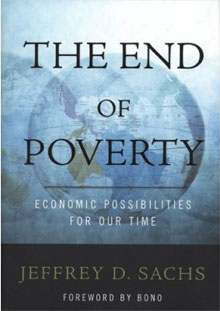Book Notes
 Jeffrey Sachs, The End of Poverty; Economic Possibilities for Our Time (New York: Penguin, 2005), 396pp. With a foreword by Bono.
Jeffrey Sachs, The End of Poverty; Economic Possibilities for Our Time (New York: Penguin, 2005), 396pp. With a foreword by Bono.
Whereas a few centuries ago virtually everyone was poor, today, observes economist Jeffrey Sachs, we have somehow arrived at an "unimaginable divide between the richest and poorest parts of the world" (p. 18). About 40% of our fellow human beings live in "poverty" (1.5 billion) or "extreme poverty" (1 billion). As the Director of Columbia University's Earth Institute, Sachs has devoted his recent professional career to solving the tragedy of people and entire countries that live in "extreme poverty," defined as people who earn $1 a day or less. In the present volume he writes with unapologetic passion and inspiration, combining economic analysis with history, case studies, and vivid anecdotes from rural Kenyan villages to presidential suites where he has served as an advisor.
There are many, complex reasons why countries are poor, but the good news, insists Sachs, is that for the most part there are reasonable and practical solutions to their problems, so that ending "extreme poverty" by the year 2025 is a "realistic possibility." Along the way he dispels common myths about past development aid to countries and racist stereotypes. He focuses not only on horribly failed economies but also thriving, successful ones that many people might have thought would never compete. For nearly three decades China, for example, has been the world's "most successful economy," growing at an average per capita rate of almost 8% per year. East Asian countries have moved ahead. We have also tackled enormous global scourges, eradicating small pox and polio, and establishing the Global Fund to Fight AIDS, TB, and Malaria.
Now is the time to eradicate extreme poverty and to help the poorest of the poor reach the bottom rung of the development ladder where they can then move on up. Sachs is a big fan of Kofi Annan ("the world's finest statesman", p. 205), the United Nations, the Millennium Development Goals, and outright debt cancellation. He takes to task the IMF and World Bank, the "money doctors" whose tired and predictable prescriptions for third world countries (austerity budgets, curb government spending, eradicate corruption, privatize and liberalize your economy) have done more harm than good. We need fewer platitudes, excuses, and moralizations from Geneva and New York, and more creative generosity, Sachs says. The real menaces are not so much ineptitude, corruption, and laziness but structural problems, geographic isolation, overall vulnerability, and rich-world miserliness. He chides the United States for its short-sighted stinginess. Our development aid has "declined for decades." We insist upon looking for "the cheap way out." We have not actually given what we publicly pledged. In his book's prescription, what it will take from rich nations is but "a mere 7 cents (ie, 0.7 percent of the gross national product) out of every $10 in income." All of our haggling about helping the poor, he observes, concerns less than 1% of rich-world income.
Sachs admits that he is an optimist and an idealist, and that some of his estimates are imprecise. Perhaps he is too enamored by the ostensible benefits of technology and globalization. I am not an economist or development aid specialist, and I can well imagine specialists picking apart details of strategy. But I for one am grateful for an economist of Sachs's stature to use all his powers of persuasion to force this issue into the forefront of public discourse. Whether from compassion, enlightened self-interest, concerns for national security, or adherence to international law (cf. the statements of the Universal Declaration of Human Rights on the economic rights of every person), I appreciate that Sachs has spoken up for those who cannot speak for themselves.


